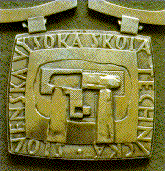I give here information for subjects taught in English.

This subject is devoted to mapping of a space into a plane.
We start with affinity and collineation.
Then we continue with Monge projection, axonometry, projection with
elevations and central projection, see syllabus.
During the semester student can obtain up to 20 points for the
homeworks.
On the exam the students solve 3 complex examples, each for 26 points.
Since I give you 2 points "for free", alltogether there are 100
points available.
Teh valuation is according to the following scheme:
A: 100-90; B: 89-80; C: 79-70; D: 69-60; E: 59-50; F: 49-2.
If a student does not agree with the mark, he proceeds to the oral part of
the exam.
There I give you one theoretical question.
This question usually covers one full lecture, in which there are plenty of
statements.
If the student does not know anything about, then he (she) losses 10 points.
However, if he (she) knows everything, he (she) gets 10 extra points.
Of course, these boundary situations are very rare, but it is obvious that a
"partly correct" answer is valued accordingly.
This gives the final marking.

This subject contains the introduction to linear algebra and mathematical
analysis, see syllabus.
During the smester there are 2 small tests, each for 15 points.
They are advertised at least 2 weeks in advance.
Anyway, if a student cannot take part in it, there is a chance to write it
later.
The penalty is that later tests are for less amount of points.
Moreover, for the first test there are just 2 possibilities to write it
later and for the second just one.
On the exam there are 6 examples for 11 points each.
Since 4 points are obtained for attending the exercises, alltogether there
are 100 points available.
The marking is according to the scheme: A: 100-91; B: 90-81; C: 80-73; D:
72-67; E: 66-60; F: 59-0.
If a student does not agree with the mark, he (she) proceeds to the oral
part of exam.
There I give you one theoretical question.
This question usually covers one full lecture, in which there are plenty of
statements.
If the student does not know anything about, then he (she) losses 10 points.
However, if he (she) knows everything, he (she) gets 10 extra points.
Of course, these boundary situations are very rare, but it is obvious that a
"partly correct" answer is valued accordingly.
This gives the final marking.
This subject is devoted to functions in more variables.
We find optima subject to given restrictions.
I.e., we discuss linear and mathematical programming, see
syllabus.
During the smester there is one small test for 20 points.
It is advertised at least 2 weeks in advance.
If a student cannot take part in the test, there is a chance to write it
later.
The penalty is that on the first extra term the test is only for 16 points
instead of 20, and on the second extra term it is only for 12 points.
Another 10 points can a student obtain for the attendance of exercises.
I choose randomly 5 exercises, at the end of which I read the list of
students.
Those present obtain immediately 2 points.
On the exam there are 6 examples for 11 points each.
Since 4 points are obtained for attending the exercises, alltogether there
are 100 points available.
The marking is according the scheme: A: 100-91; B: 90-81; C: 80-73; D: 72-67;
E: 66-60; F: 59-0.
If a student does not agree with the mark, he proceeds to the oral part of
the exam.
There I give you one theoretical question.
This question usually covers one full lecture, in which there are plenty of
statements.
If the student does not know anything about, then he (she) losses 10 points.
However, if he (she) knows everything, he (she) gets 10 extra points.
Of course, these boundary situations are very rare, but it is obvious that a
"partly correct" answer is valued accordingly.
This gives the final marking.
You can contact me by e-mail at the address knor@math.sk.